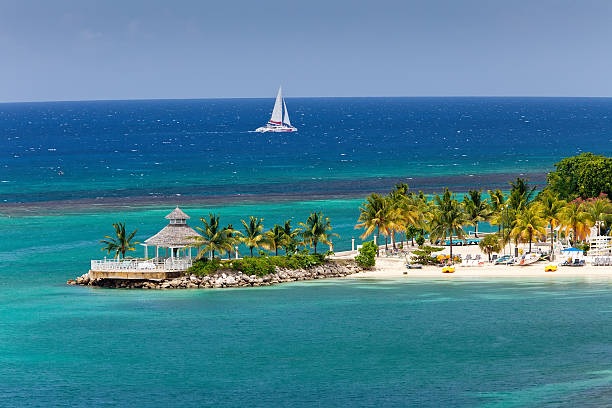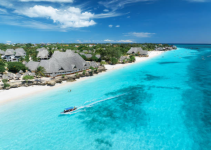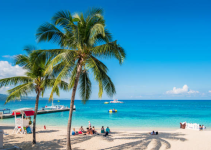Jamaica calls to millions of travelers every year with its turquoise waters, reggae rhythms, and that infectious island energy. You’ve probably seen the postcards. The reality? Even better than you think.
But here’s what nobody tells you in the glossy brochures. A few simple missteps can turn your dream vacation into a frustrating experience. I’m talking about the kind of mistakes that leave you feeling stressed, unsafe, or completely ripped off.
Your trip deserves better than that. So let’s talk about what to actually watch out for so you can focus on the good stuff—the jerk chicken, the waterfalls, and those impossibly perfect beaches.

Things to Avoid in Jamaica as a Tourist
Jamaica rewards the prepared traveler, and knowing what to steer clear of makes all the difference between a good trip and an unforgettable one. Here’s what you need to keep on your radar.
1. Flashing Expensive Jewelry and Electronics
Your diamond earrings might look great with your resort wear, but they’re also broadcasting something you don’t want to advertise. The same goes for that brand-new iPhone you’re waving around for photos or the designer watch catching sunlight on your wrist.
Jamaica has neighborhoods where poverty sits right next to tourism hotspots. That’s just reality. And while most Jamaicans are genuinely warm and welcoming people, you don’t want to make yourself an obvious target. Petty theft happens, especially in crowded areas like markets or busy streets in Kingston and Montego Bay.
Leave the expensive stuff in your hotel safe. Seriously. Bring a waterproof phone case for beach photos if you must, but keep it tucked away when you’re walking around. A simple watch works fine. Your vacation photos will look just as good without the bling, and you’ll feel a whole lot more relaxed.
Think about it this way: you wouldn’t walk through Times Square counting cash, right? Apply that same logic here. Keep valuables minimal and discreet.
2. Accepting Rides from Unlicensed Taxi Drivers
You step out of the airport, and suddenly you’re surrounded by people offering rides. “Taxi, taxi! Best price!” they’re calling out. Your instinct might be to just hop in and save a few bucks.
Don’t do it.
Unlicensed taxis are a real concern in Jamaica. These drivers don’t have insurance, their vehicles often aren’t properly maintained, and they’re not regulated by any tourism board. Some tourists have reported being overcharged by outrageous amounts. Others have faced safety issues. There have even been cases—rare but real—of tourists being driven to ATMs and pressured to withdraw money.
Look for licensed taxis, which have red license plates starting with “PP” (for public passenger). These drivers are registered, their rates are somewhat standardized, and they’re accountable to authorities. Yes, you might pay a bit more than that guy promising the “best deal,” but your safety is worth every extra dollar. Your resort can also arrange transportation, or you can use JUTA (Jamaica Union of Travellers Association) taxis, which are reliable and trustworthy.
This goes for ride-sharing too. While some apps are starting to operate in Jamaica, always verify your driver’s credentials before getting in any vehicle.
3. Drinking Tap Water
Here’s where your home habits need to change. That glass of water from the bathroom sink? Skip it. The ice in your roadside drink? Maybe not your best choice either.
Jamaica’s tap water isn’t consistently safe for tourists to drink. Local residents have built up immunity to certain bacteria that your system hasn’t encountered. The result? You could spend several days of your precious vacation dealing with stomach issues. Not exactly the beach day you planned.
Stick with bottled water, which is cheap and available everywhere. Most resorts and hotels provide it or have filtered water systems—use them. If you’re buying drinks from vendors, ask if the ice is made from purified water. Many established places use filtered water for ice, but it never hurts to check.
Brushing your teeth with tap water is generally fine, but if you have a sensitive stomach, use bottled water for that too. Pack a reusable water bottle and refill it with safe water throughout the day. Staying hydrated in the Caribbean heat is crucial, but doing it safely matters more.
4. Wandering into Unfamiliar Neighborhoods After Dark
Kingston has some amazing culture, music venues, and local spots that tourists love. But it also has areas where you really don’t want to be wandering around at night, especially if you don’t know your way.
Even in resort towns like Montego Bay or Ocho Rios, there are neighborhoods that locals themselves avoid after sunset. Your hotel staff aren’t being dramatic when they warn you about certain areas. They’re giving you information that could keep you out of genuinely risky situations.
This doesn’t mean you need to be paranoid or locked in your resort 24/7. It means being smart. If you want to experience nightlife, go to established venues that cater to tourists and locals alike. Take a licensed taxi there and back. Stick to well-lit, populated areas. Ask your hotel concierge which spots are safe for evening outings.
The street you walked down at noon might feel completely different at midnight. Trust that instinct. If something feels off, head back. Your adventure shouldn’t come at the cost of your safety. There’s plenty to explore during daylight hours and in safe evening spots.
5. Being Rude or Impatient with Locals
Island time is real. Service might move more slowly than you’re used to. That restaurant order could take 45 minutes instead of 20. Your resort check-in might involve chatting and laughter before getting down to business.
Getting frustrated won’t speed things up. Actually, it’ll probably make everything worse.
Jamaicans value respect and friendliness. Snap at a server or act entitled at a shop, and don’t be surprised if your service quality drops. But show genuine warmth and patience? You’ll often find people going out of their way to help you. That’s just how the culture works.
“Soon come” is a phrase you’ll hear often. It means “I’ll get to it shortly” but the timeline is… flexible. Instead of checking your watch every 30 seconds, use it as a chance to slow down. You’re on vacation, after all. Chat with people. Enjoy the moment. The beach isn’t going anywhere.
This applies to bargaining too. Yes, you can negotiate at markets and with craft vendors. But do it with a smile and respect. There’s a difference between friendly haggling and insulting someone’s livelihood. Keep your tone light, know when to walk away, and accept that sometimes the price is the price.
People respond to energy. Bring good energy, and you’ll get it back tenfold.
6. Skipping Sun Protection
Caribbean sun hits different. Like, actually different. You might tan gradually back home, but Jamaica’s sun can burn you badly in under an hour.
I’ve seen tourists on day two of their trip looking like lobsters, miserable and unable to enjoy the rest of their vacation. The UV index near the equator doesn’t mess around. Even on cloudy days, those rays are getting through.
Bring high-SPF sunscreen and apply it generously. Reapply after swimming or every two hours if you’re out all day. Get the water-resistant kind. Cover areas you might forget—ears, tops of feet, back of your neck, that little part in your hair. Wear a hat. Those straw hats vendors sell on the beach? They’re not just souvenirs. They’re practical.
Aloe vera grows everywhere in Jamaica for a reason. Locals know the sun is serious. If you do get burned, fresh aloe is your friend, but prevention beats treatment every time.
Your skin will thank you. More importantly, you’ll actually be comfortable enough to enjoy your trip instead of wincing every time fabric touches your shoulders.
7. Buying from Aggressive Beach Vendors
You’re lying on the beach, finally relaxed. Then someone appears selling wood carvings. Then another with jewelry. Then someone offering massages, hair braiding, or tours. They’re persistent. Sometimes pushy. The word “no” doesn’t always register the first time.
This is tricky because many are just trying to make a living, and some genuinely have beautiful handmade crafts. But others are running scams, selling low-quality items at inflated prices, or won’t leave you alone once you engage.
Your best strategy? A polite but firm “no thank you” without breaking stride or making eye contact. Don’t stop to look at their goods unless you’re actually interested in buying. Once you engage, it becomes much harder to disengage.
If you want to buy local crafts, visit established markets like the one in Ocho Rios or shops recommended by your hotel. You’ll get better quality, fairer prices, and a more relaxed shopping experience. Supporting local artisans is wonderful, but do it on your terms, not because someone wore you down.
Some beaches have designated vendor-free zones. Ask your hotel which ones those are if you want zero interruptions. Private beaches at all-inclusive resorts typically don’t allow outside vendors at all, which is one reason some tourists prefer them.
8. Ignoring Local Customs and Dress Codes
Jamaica is a conservative country in many ways that might surprise you. Yes, there are party vibes and laid-back attitudes at tourist areas. But step outside those zones, and different rules apply.
Beachwear stays at the beach. Walking around town in your bikini top or swim trunks? That’s going to get you stares and might actually be prohibited in some areas. Cover up when you leave the sand. Shops and restaurants often have dress codes, even casual ones.
Church is a big deal here. If you happen to visit on a Sunday, you’ll see people dressed impeccably for service. Showing respect for religious customs matters. Don’t wander into churches in your tank top and shorts. If you’re invited to someone’s home, dress modestly and bring a small gift if possible.
Public displays of affection beyond hand-holding can make locals uncomfortable, especially outside tourist areas. Same-sex couples should be particularly aware that Jamaica is still fairly conservative regarding LGBTQ+ issues, though attitudes are slowly changing, especially in tourist zones.
Understanding these cultural nuances shows respect. You’re a guest in someone else’s home. Acting accordingly opens doors and creates better experiences. Plus, locals will appreciate your effort and often respond with even more warmth and hospitality.
9. Falling for Unofficial “Tour Guides”
You’re at Dunn’s River Falls, and a friendly guy approaches offering to be your guide for the climb. Or you’re in downtown Kingston, and someone volunteers to show you the best spots. They seem nice. They know the area. What’s the harm?
The harm is they’ll expect payment—often significant payment—at the end. And they might pressure you or make you feel obligated. Some “guides” have even led tourists into sketchy situations or to shops where they get commission on whatever you buy.
Book tours through legitimate companies or your hotel. Licensed tour guides have identification and set rates. They’re trained, insured, and accountable. Yes, it costs more upfront, but you know exactly what you’re paying and you’re protected if something goes wrong.
If someone approaches offering guide services, politely decline. If you genuinely want their help, negotiate and agree on a price before you start. Get it crystal clear. Better yet, just stick with official options. There are plenty of excellent tour operators in Jamaica who provide amazing experiences without any of the awkwardness or potential danger.
10. Assuming You Can Haggle Everywhere
Markets and craft vendors? Yes, haggling is expected and part of the fun. That carved wooden mask for $40? You can probably get it for $25-30 with friendly bargaining.
Restaurants, gas stations, grocery stores, licensed taxis? Nope. Prices are prices.
Some tourists try to negotiate everything, thinking the entire country operates on a bargaining system. It doesn’t. Regular businesses have set prices, and trying to haggle at a restaurant or pharmacy will just come across as disrespectful or odd.
Learn to read the situation. Informal vendors at markets are fair game. Street vendors selling fresh fruit might negotiate. But established businesses operate with fixed pricing, just like back home. Taxis should discuss the fare before you get in (since many don’t use meters), but that’s agreeing on a rate, not haggling it down.
Respect boundaries. If someone says “that’s the price,” believe them. Getting a good deal is nice, but maintaining dignity and respect matters more. Plus, many prices in Jamaica are already quite reasonable compared to tourist destinations elsewhere. Sometimes paying the asking price is perfectly fair, especially for handmade items that took hours to create.
Wrapping Up
Jamaica gives you exactly what you bring to it. Come with respect, common sense, and a genuine openness to the culture, and you’ll have an incredible time. Those turquoise waters I mentioned at the start? They’re waiting for you. So are the mountains, the music, the food that’ll ruin you for Caribbean cuisine anywhere else.
Just keep these tips in your back pocket. Stay aware without being paranoid. Be smart about safety without missing out on authentic experiences. Your best Jamaica trip happens when you’re prepared enough to relax and actually enjoy yourself.
Pack your sunscreen, leave the expensive jewelry at home, and get ready for an island that’ll probably steal a piece of your heart. Safe travels.


